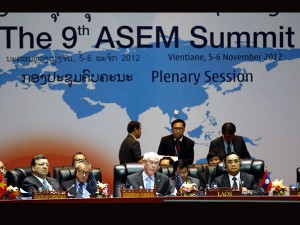Asia-Europe leaders close ranks to fight crisis

European Council President Herman Van Rompuy, center, speaks as Laotian Prime Minister Thongsing Thammavong, right, and European Commission President Jose Manuel Barroso, left, listen during the closing ceremony for the Asem Summit in Vientiane, Laos, Tuesday, Nov. 6, 2012. Asian and European leaders renounced protectionism and vowed to promote trade between the two regions in the face of “substantial” uncertainties facing the global economy. AP
VIENTIANE, Laos—Leaders from Asia and Europe on Tuesday renounced protectionism and vowed to promote trade between the two regions in the face of “substantial” uncertainties facing the global economy.
Dozens of leaders converged on small landlocked Laos for the Asia-Europe Meeting (Asem), seeking to strengthen links between two regions that together account for about half of the world’s economic output.
Following a charm offensive by EU officials to reassure Asia that the euro crisis is finally easing, the participants voiced hope that the European economy would “gradually recover” from its current slump.
But they struck a cautious tone about the worldwide economic outlook.
“Global growth has decelerated with substantial remaining uncertainties and downside risks,” the closing statement said.
Top European officials including French President Francois Hollande and Italian Prime Minister Mario Monti led efforts to boost trade with Asian nations that have been a rare bright spot in the gloomy global economy.
Leaders from the two regions pledged to refrain from erecting barriers to trade and investment, saying closer economic relations were crucial to nurse the ailing world economy back to health.
“Part of the growth in Asia is also the result of the open market in Europe because we are the most important destination for Asian products,” European Commission President Jose Manuel Barroso said.
“We don’t see trade as a panacea but certainly we see trade as a very important driver for growth in Europe and in Asia and indeed in the rest of the world,” he added.
The efforts to win Asian support for steps to calm the debt crisis raging in the eurozone reflected the growing importance that Europe places on Asia’s vibrant economies.
For years Western outrage over Myanmar’s human rights abuses – including the longtime detention of Nobel laureate Aung San Suu Kyi and other political prisoners – was a major cause of friction between the two regions.
After reforms including the release of political detainees and Suu Kyi’s election to parliament, the West has begun easing sanctions to reward President Thein Sein.
The former general came under pressure at the summit to bring an end to a wave of deadly clashes between Buddhists and Rohingya Muslims in the western state of Rakhine that has prompted fears of a humanitarian crisis.
“At a time of so much progress on human rights we would also look for progress on the treatment of ethnic minorities,” Australian Prime Minister Julia Gillard told reporters after talks with Thein Sein.
Myanmar has signed a series of ceasefire deals with armed ethnic minority rebels but the efforts have been overshadowed by the Rakhine violence, which has left dozens dead and more than 100,000 displaced since June.
British Foreign Secretary William Hague urged “all political parties in Burma (Myanmar) to do what they can to end the violence and address the issue of Rohingya citizenship.”
Myanmar’s 800,000 Rohingya are seen by the government and many in the country as illegal immigrants from neighboring Bangladesh, and are described by the UN as among the world’s most persecuted minorities.














